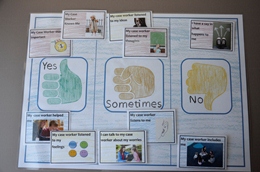15 October 2013
 A unique communications tool, developed at UniSA’s Australian Centre for Child Protection (ACCP), has been piloted with children who were the subject of a child protection investigation in Western Australia, giving them the chance to have their say about their experience at the centre of those investigations.
A unique communications tool, developed at UniSA’s Australian Centre for Child Protection (ACCP), has been piloted with children who were the subject of a child protection investigation in Western Australia, giving them the chance to have their say about their experience at the centre of those investigations.
UniSA Psychology Honours student Samantha Finan, who is undertaking her research at the ACCP, developed the tool which enables children to rate how well their case workers engage them and how included they feel in conversations about their welfare.
Children aged between 6 and 14, have used the ratings tool, mapping their responses to simple statements such as “my case worker listened to my ideas” to images indicating “yes”, “no” or “sometimes”.
UniSA’s Dr Mary Salveron, who is leading the research into the use of Signs of Safety as a child protection practice framework in Western Australia, says the tool is unique in engaging child responses, adding to research which will generate a better understanding of how effective those services are.
“So often in the world of child protection, the voices of those who really matter and who really count – children – are not given enough focus,” says Dr Salveron.
“The nature of being the subject of a child protection investigation can prove daunting for many young people who may be reluctant to speak, or not even given the opportunity to speak.
“The ratings tool is designed to help children communicate simply and in a way which registers their feelings about their case workers, to have their opinion taken into account when it comes to matters concerning their own future.”
The rating tool is one of several research projects which the ACCP is using to examine a fresh approach to child protection practice – Signs of Safety, following its implementation state wide across Western Australia.
The centre has begun a three year program of research in partnership with the Western Australia Department for Child Protection and Family Support (CPFS), examining the impact and extent to which the Signs of Safety approach is improving the outcomes of children at risk of abuse or neglect.
“Through this research we will be able to determine what aspects of this framework have worked well and what may be improved upon, to create the best outcomes for children, families and practitioners,” Dr Salveron added.
The Centre’s research findings could also be used to positively influence child protection practices outside of Western Australia; Signs of Safety is now being utilised in 10 other countries around the world and is also expected to be implemented in Queensland, Tasmania and the Northern Territory.
Kay Benham, Acting Director General of CPFS says: “The research work the ACCP is undertaking is helping to build much needed knowledge about working effectively with children and their families in child protection work in WA, and how Signs of Safety can make a positive difference to those who are most vulnerable in our society. We look forward to a continued and successful collaboration.”
Contact Dr Mary Salveron office (08) 8302 2980 email mary.salveron@unisa.edu.au
Will Venn office (08) 8302 2986 email will.venn@unisa.edu.au


